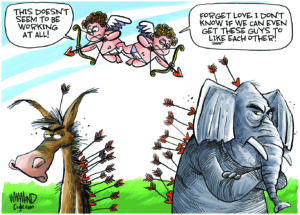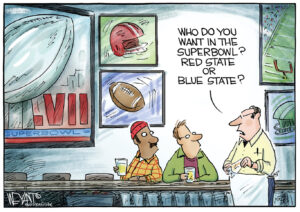GOP Tactic: Intramural Class Warfare
Seizing the circumstances of hard times, the Republicans are promoting and provoking intramural class warfare. They are pitting what is left of the private-sector middle class against the public-sector middle class.Mitch Daniels, the new governor of Indiana, is probably the smartest of the new crop of Republican governors determined to bring public employee unions to heel. This is the way he puts it:
“Public jobs grew while private jobs were lost. Public salaries went up while private sectors are shrinking. It’s time to interrupt that loop, in the public interest.”
You can read that a couple of ways. Perhaps the reason private-sector jobs are shrinking — in numbers and compensation — is precisely because corporations have broken most of the unions in the country. Only 7 percent of Americans working in the private sector have the protections unions generally provide. Forty percent of public employees, on the other hand, are union members.
Without doubt, there will be political gains for Daniels’ party if they can bring organized labor to its knees. Just as obviously, unions are an important part of the Democratic Party’s financial and political base.
Republicans are of course against class warfare, the poor against the rich, the middle class against the rich. And so they should be; the corporate elite of the country and what George H.W. Bush called “the investing classes” have already won that war, at least in the private sector, as those union membership numbers attest.
But, seizing the circumstances of hard times, the Republicans are promoting and provoking intramural class warfare. They are pitting what is left of the private-sector middle class against the public-sector middle class. It is a brilliant tactic, backed up by what Republicans themselves define as “fuzzy math.” But actually it is not about math; it is about mobilizing resentment and envy. And the rich are totally out of this intramural class war.
I happen to have spent most of my life working for myself, but I have been a member of three unions: the Newspaper Guild, the American Federation of Television and Radio Artists and the Screen Actors Guild. I have not been impressed with the leadership and policies of any of them, but they were the price of admission for the work I wanted to do.
Still, I am pro-union for the most basic of reasons. Individual workers would not have and many do not have common-sense protections, beginning with wage stability and good working conditions and employee benefits. My own work experience probably explains my feelings. Out of college, I went to work as an engineer for Ingersoll Rand, an important supplier of heavy equipment for construction and production. It was not long before I realized that most of my fellow workers were unhappy people, terrified of the whims of management, much less the ownership.
One day, at lunch, while my friends grouched about the usual, the word union slipped from my lips. A regular Norma Rae. Some people never spoke to me again. I ended up working at the Newark Evening News, the best newspaper in New Jersey, but virulently anti-union. I was paid $60 a week plus $25 in expenses (we had to provide our own cars to cover hundreds of square miles of northern New Jersey). I got lucky with a couple of stories and was hired by the New York Herald Tribune. The Trib was a guild paper and my pay went to $163.60, a fortune to me. I was even able to buy a house.
It was a time, by the way, when there was a clear line between private and public work. Generally, public workers were paid less but got better benefits and more job security. It was a conscious choice to work for the military, for bureaucracies, in schools. The system was formal enough that teachers were trained in separate colleges, state teachers colleges.
So, the breaking of the unions is knocking middle-class workers, private and public, back toward the Gilded Age, as the rich continue to get richer and the middle class gets poorer. If the financier Jay Gould, a great buyer of politicians, was a spokesman for that time, this is what he said as he hired strikebreakers in an 1886 railroad strike: “I can hire half the working class to kill the other half.”
© 2011 Universal Uclick
Your support matters…Independent journalism is under threat and overshadowed by heavily funded mainstream media.
You can help level the playing field. Become a member.
Your tax-deductible contribution keeps us digging beneath the headlines to give you thought-provoking, investigative reporting and analysis that unearths what's really happening- without compromise.
Give today to support our courageous, independent journalists.






You need to be a supporter to comment.
There are currently no responses to this article.
Be the first to respond.